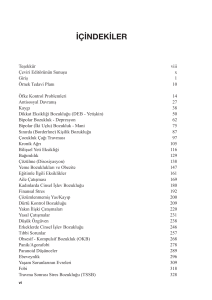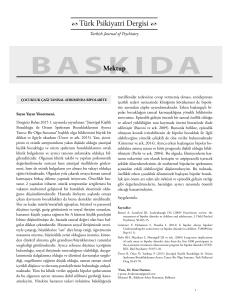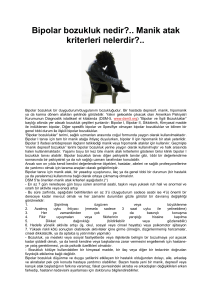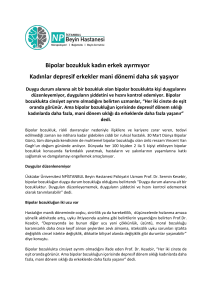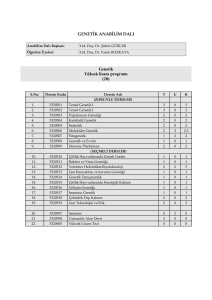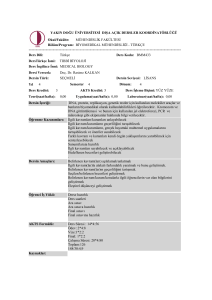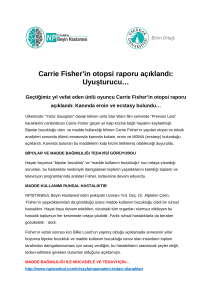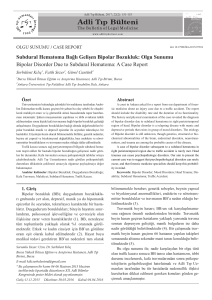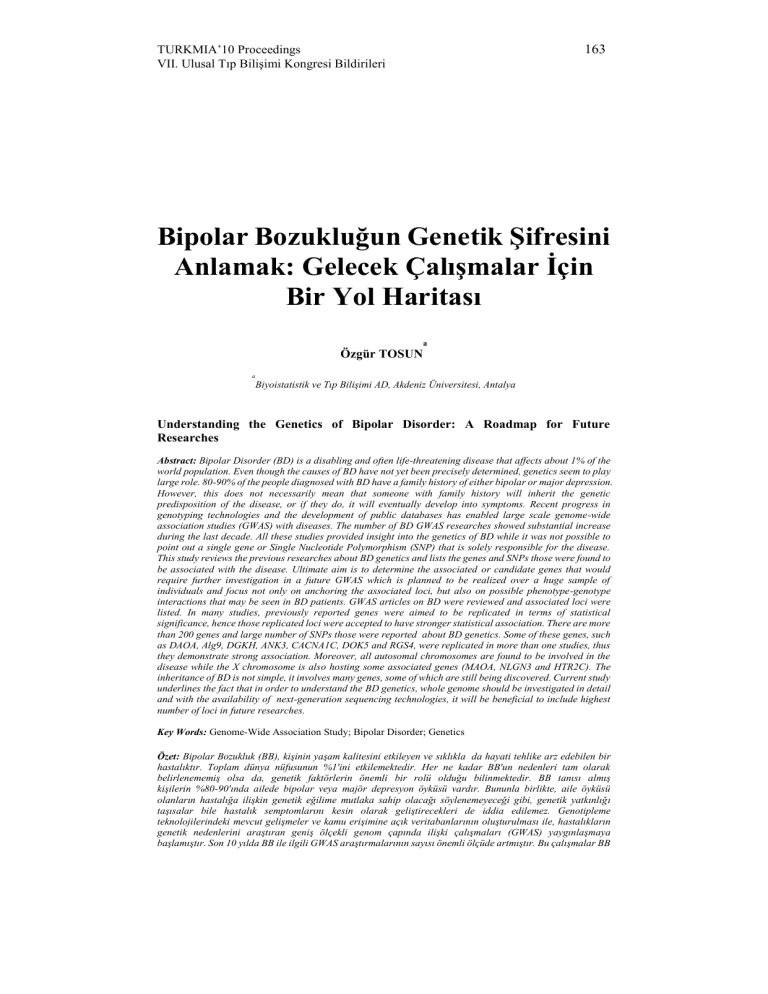
TURKMIA’10 Proceedings
VII. Ulusal Tıp Bilişimi Kongresi Bildirileri
163
Bipolar Bozukluğun Genetik Şifresini
Anlamak: Gelecek Çalışmalar İçin
Bir Yol Haritası
Özgür TOSUN
a
a
Biyoistatistik ve Tıp Bilişimi AD, Akdeniz Üniversitesi, Antalya
Understanding the Genetics of Bipolar Disorder: A Roadmap for Future
Researches
Abstract: Bipolar Disorder (BD) is a disabling and often life-threatening disease that affects about 1% of the
world population. Even though the causes of BD have not yet been precisely determined, genetics seem to play
large role. 80-90% of the people diagnosed with BD have a family history of either bipolar or major depression.
However, this does not necessarily mean that someone with family history will inherit the genetic
predisposition of the disease, or if they do, it will eventually develop into symptoms. Recent progress in
genotyping technologies and the development of public databases has enabled large scale genome-wide
association studies (GWAS) with diseases. The number of BD GWAS researches showed substantial increase
during the last decade. All these studies provided insight into the genetics of BD while it was not possible to
point out a single gene or Single Nucleotide Polymorphism (SNP) that is solely responsible for the disease.
This study reviews the previous researches about BD genetics and lists the genes and SNPs those were found to
be associated with the disease. Ultimate aim is to determine the associated or candidate genes that would
require further investigation in a future GWAS which is planned to be realized over a huge sample of
individuals and focus not only on anchoring the associated loci, but also on possible phenotype-genotype
interactions that may be seen in BD patients. GWAS articles on BD were reviewed and associated loci were
listed. In many studies, previously reported genes were aimed to be replicated in terms of statistical
significance, hence those replicated loci were accepted to have stronger statistical association. There are more
than 200 genes and large number of SNPs those were reported about BD genetics. Some of these genes, such
as DAOA, Alg9, DGKH, ANK3, CACNA1C, DOK5 and RGS4, were replicated in more than one studies, thus
they demonstrate strong association. Moreover, all autosomal chromosomes are found to be involved in the
disease while the X chromosome is also hosting some associated genes (MAOA, NLGN3 and HTR2C). The
inheritance of BD is not simple, it involves many genes, some of which are still being discovered. Current study
underlines the fact that in order to understand the BD genetics, whole genome should be investigated in detail
and with the availability of next-generation sequencing technologies, it will be beneficial to include highest
number of loci in future researches.
Key Words: Genome-Wide Association Study; Bipolar Disorder; Genetics
Özet: Bipolar Bozukluk (BB), kişinin yaşam kalitesini etkileyen ve sıklıkla da hayati tehlike arz edebilen bir
hastalıktır. Toplam dünya nüfusunun %1'ini etkilemektedir. Her ne kadar BB'un nedenleri tam olarak
belirlenememiş olsa da, genetik faktörlerin önemli bir rolü olduğu bilinmektedir. BB tanısı almış
kişilerin %80-90'ında ailede bipolar veya majör depresyon öyküsü vardır. Bununla birlikte, aile öyküsü
olanların hastalığa ilişkin genetik eğilime mutlaka sahip olacağı söylenemeyeceği gibi, genetik yatkınlığı
taşısalar bile hastalık semptomlarını kesin olarak geliştirecekleri de iddia edilemez. Genotipleme
teknolojilerindeki mevcut gelişmeler ve kamu erişimine açık veritabanlarının oluşturulması ile, hastalıkların
genetik nedenlerini araştıran geniş ölçekli genom çapında ilişki çalışmaları (GWAS) yaygınlaşmaya
başlamıştır. Son 10 yılda BB ile ilgili GWAS araştırmalarının sayısı önemli ölçüde artmıştır. Bu çalışmalar BB
164
genetiğine ilişkin daha çok bilgiye erişmemizi sağlamış da olsa hastalıktan tek başına sorumlu olan tek bir gen
veya Tek Nükleotid Polimorfizm (SNP) tespit edilememiştir. Bu çalışmada BB genetiğine ilişkin bilimsel
çalışmalar incelenmiş ve bu hastalıkla ilişkili bulunan gen ve SNPler listelenmiştir. Esas amaç, ilişkili veya
aday genlerin tespit edilerek gelecekte yapılması planlanan bir GWAS araştırmasında bu bölgelerin daha
detaylı araştırılmasını sağlamaktır. Bahsedilen çalışma, geniş sayıda bir örneklem üzerinde yürütülmesi
planlanan ve hastalıkla ilişkili genetik bölgelerin tespitinin yanında BB hastalarında görülebilecek olası
fenotip-genotip etkileşimlerini de ortaya koymayı hedeflemektedir. BB ile ilgili GWAS çalışmaları incelenmiş
ve ilişkili lokuslar tespit edilmiştir. Birçok çalışmada, bu lokuslar istatistiksel anlamlılık bakımından tekrar
test edilmişlerdir ve anlamlılığı tekrar gösterilen lokusların daha kuvvetli bir ilişki gösterdiği kabul edilir. Bu
çalışmalar sonucunda BB genetiğine ilişkin 200'ün üzerinde gen ve çok sayıda SNP istatistiksel olarak önemli
bulunmuştur. Bu genlerden bazıları (DAOA, Alg9, DGKH, ANK3, CACNA1C, DOK5, RGS4 vb.) en az iki
çalışmadan replike edilebilmiştir ve böylece güçlü bir ilişki ifade etmektedirler. Ayrıca, tüm otozomal
kromozomların BB ile ilişkili olduğu ve X kromozomunun da bazı ilişkili genleri (MAOA, NLGN3 and HTR2C)
taşımakta olduğu gösterilmiştir. BB'un kalıtımı basit bir olgu değildir; halihazırda bilinen veya hala tespit
edilememiş olan birçok geni içerir. Bu çalışma göstermiştir ki; BB'u etkileyen genetik faktörleri tam olarak
kavrayabilmemiz için tüm insan genomunun detaylı olarak analiz edilmesi gerekir. Yeni nesil sekanslama
teknolojilerinin de gelişmesi ile birlikte, mümkün olan en fazla lokusun kapsanması, BB genetiğini anlamada
yararlı olacaktır.
Anahtar Kelimeler: Genom Çapında İlişki Çalışmaları; Bipolar Bozukluk; Genetik
Sorumlu Yazarın Adresi
Özgür TOSUN. Akdeniz Üniversitesi Tıp Fakültesi, Biyoistatistik ve Tıp Bilişimi Anabilim Dalı, Kampüs,
Antalya
E-posta: [email protected]

